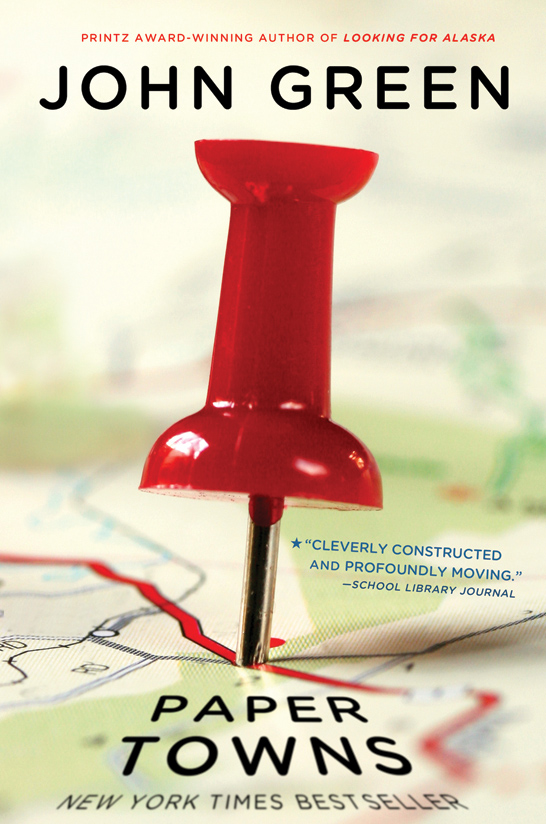 Yesterday we told you about the letter from the National Coalition Against Censorship, signed by CBLDF and other anti-censorship organizations, urging Florida’s Pasco County School District to restore Paper Towns by John Green to an eighth grade summer reading list. Now Pasco County Superintendent Kurt Browning has responded to local and national criticism by claiming that no censorship took place and that district officials weren’t even sure if they needed to follow the challenge policy in this case.
Yesterday we told you about the letter from the National Coalition Against Censorship, signed by CBLDF and other anti-censorship organizations, urging Florida’s Pasco County School District to restore Paper Towns by John Green to an eighth grade summer reading list. Now Pasco County Superintendent Kurt Browning has responded to local and national criticism by claiming that no censorship took place and that district officials weren’t even sure if they needed to follow the challenge policy in this case.
In response to an editorial that ran in the Tampa Bay Times last Friday, Browning issued a statement which he also forwarded to National Coalition Against Censorship Executive Director Joan Bertin:
The editorial regarding the recent removal of John Green’s Paper Towns contained some inaccurate information that leads the reader to believe that this book was banned from Pasco County schools. That is not the case. Rather, the title was simply eliminated from a teacher’s summer reading list of possible books for students to read over the summer. The parent’s email brought the inclusion of this book to the attention of the Office for Teaching and Learning. It was quickly recognized that this title was not recommended by authoritative reviewing sources for the age group targeted for that reading list, so the title was removed from the list while the district determined whether the full review process that is outlined in Board policy should be put into action. At no time was any copy of the book removed from school media centers, nor was it “banned” as suggested by the title of the editorial. We currently have this book available in many of our high schools and some of our middle schools.
In addition, the Office for Teaching and Learning will be recommending some changes to procedures regarding the selection of instructional materials that will ensure that students and parents have more information regarding controversial topics that may be included in reading lists or other instructional activities.
The argument that a book is not banned if it’s still available in libraries or bookstores is one that we hear frequently, but Bertin deftly rebutted that line in her own response, pointing out that “a book does not have to be censored everywhere to be censored somewhere. Any action by school officials to restrict access to a book because some object to its ideas or content offends fundamental First Amendment principles.” As for Browning’s contention that the district is still determining “whether the full review process that is outlined in Board policy should be put into action,” Bertin pointed out what should have been obvious:
The procedures outlined in Section 2520 of the school board policies, “Selection of Instructional Materials and Equipment,” referenced in our previous letter, apply “[w]hen a citizen disagrees with the materials being used in the instructional program of the District.” The summer reading assignment is surely part of the “instructional program.” As a result, we submit that the procedures outlined in that section are required before a book can be removed from the reading list in response to a complaint about its content.
Bertin also pointed out that Paper Towns is not the only book on the reading list that explores “serious and challenging themes,” and we would add that Publishers Weekly does in fact recommend it for ages 12 and up. (For reference, eighth graders are generally 13-14 years old.) School Library Journal and Booklist both think the book is better suited for high schoolers, but it’s certainly not unusual for reviews to vary slightly in that regard. In any case the goal of open-option summer reading assignments like this is to keep students reading and thinking critically while they’re out of school, and teachers surely knew that some students were ready for the challenge of Paper Towns. Even the parent who originally objected to the book for her own daughter acknowledged that it may be fine for other households, and says she never asked for it to be removed from the list.
No matter how Browning tries to spin it, what Pasco County School District administrators did is second-guess the professional educators who compiled the list and the parents who knew their children were mature enough to handle the book. And because the challenge policy was not observed, this action was carried out with no transparency or opportunity for public input.
Please help support CBLDF’s important First Amendment work by making a donation or becoming a member of the CBLDF!
Contributing Editor Maren Williams is a reference librarian who enjoys free speech and rescue dogs.